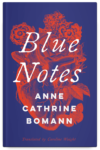
[Book*hug Press; 2021]
In a new collection of essays, Permanent Revolution, Canadian feminist writer Gail Scott sketches her evolution of experimentation towards a more plural, and porous text. The essays here — collected in two halves, “The Smell of Fish” and a revised selection from the 1989 “Spaces like Stairs” — don’t just describe this evolution, but are embodiments of it. Formally, they follow in the spirit of upheaval, fluidity, and collectivity central to Scott’s pursuit of a living text, what she describes as a “web of signification and an intertextuality that has no origin nor destination.”
Scott approaches a new form of narration that corresponds more accurately to the “way we think, talk, live.” The collection does not trace a linear history. It jumps, wanders, and collects, moving in accidental, jumbled leaps across time and space. The writing is embedded in Scott’s everyday, conversations with friends, visits to the museum, listless hours in a West Village café. Her syntax is architectural, an untamed mathematics, and yet there is an immediacy to her tone that makes the writing feel plainspoken. The text’s intimacy with the everyday is not limited to the small. It rides right up against the context of its own writing — a global pandemic, institutionalized violence against people of color — eschewing the Text’s classic concern with timelessness, in favor of a more lucid and conscientious engagement with the current stakes of survival.
It is fixity, above all, that Scott resists — on the level of politics, identity, and prose — meaning made singular and contained for the purpose of mastery alone. With Permanent Revolution, she creates a live text that does not strive towards closure or finality, but rather is experienced in its transience and becoming. Scott envisions an active meaning, sentence, and subject-in-becoming that wrestles in continuous interplay with the wider ecology around it.
“I have been avoiding using, as best I can unary voiced narration,” she writes in “The Sutured Subject,” “by sharding character to allow a maximum porosity or absorption of noise and text along a line where intrinsic and extrinsic meet.”
Permanent Revolution is radically intertextual as Scott approaches a decentralized, plural authorship. In this way, the text embodies the ethos of collective exchange central to her French Canadian writing community of the eighties. Permanent Revolution is noisy, cacophonous. Scott interweaves alongside her own the writing of those she calls her mothers: Cixous, Irigaray, Lispector and her sisters: Sunday, A Theory salon members like France Theoret, Nicole Brossard, and Carla Harryman. “Polyphonic ventriloquy” she calls it at one point, as the speaking voice becomes a conduit for a chorus.
The text is an open site not only for the commingling of her peers, but something more amorphous and transitory as well: noise. “Contemporary women artists often seek, because we can, utopia in the white noise of cities, the noise of crowds, of cinema, theatre, music. Noise exceeds identity,” she writes in “The Porous Text, or the Ecology of the Small Subject.” Scott opens her text to what is supposedly “exterior” to it, disrupting the distinction between outside and in, “text” and “non-text.”
Boundaries are what obsess her, lines of containment that divide one thing from another, and separate self from Other. In Permanent Revolution, Scott grinds away at this line, which becomes no longer an impassable solid, but a loose and hazy collection of points. She draws a fluid, mobile relation between things, collapsing the rift between literary genres, — memoir, fiction, theory — voices, and selves.
Bound up inextricably in this experiment of meaning making and unmaking is a greater politics of power, language, and displacement. Outside and in, margin and center, do not just refer to the text, but to the relationship between marginalized people and a dominant class, the normal and paranormal. “Who has the right to speak?” Scott asks finally. “Who am we?”
Tess Michaelson is a writer based in New York. She earned her degree in English from Stanford University and an MFA in Nonfiction Writing from Columbia University. She is currently at work on a book-length essay about writing, performance and refusal.
This post may contain affiliate links.







